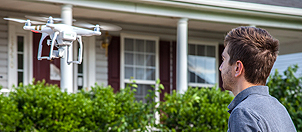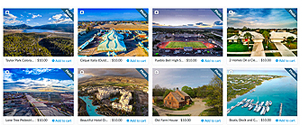Drone Journalism and the Law: Is There a Need For More Clarity?

Should news media organizations be exempt from state laws restricting where drones can fly and for what purpose? These laws are in place to protect the rights of citizens and businesses from unwarranted intrusions, including illicit spying. But many observers, citing the First Amendment, say the cause of press freedom is simply too important to allow unduly restrictive drone laws to limit the ability of journalists to gather and report on the news. Drones, after all, can often go where foot-based journalists cannot; and with their speed and visual reporting capabilities, can investigate and expose “hidden” wrong-doing. Do we really want privacy concerns to weaken the media’s public watchdog function?
Edward W. Tooley, in a research paper published earlier this year, argues that too many state laws fail to include provisions specifically related to the evolving technology of “drone journalism,” and as a result, these laws, however, well-intended, may impede legitimate news reporting at the expense of the public’s “right to know.”
One of the state laws at the center of Tooley’s paper was passed in Texas in 2013; it’s since become a center of controversy among news media organizations nationwide. The so-called “Texas Privacy Law” was intended, in principle, to establish a balanced regulatory framework for drone flying in Texas, consistent with the broad guidelines contained in federal aviation law. It seems to have accomplished nothing of the sort. Instead, it’s at the center of a bitter ongoing legal dispute between state officials and advocates for press freedom, who are demanding fewer restrictions on “drone journalism” in Texas and elsewhere.
Current laws regarding drones and press freedom are murky at best. Federal law grants the FAA a monopoly of regulatory influence over the nation’s airspaces and establishes some important common-sense restrictions on drones, such as flying too close to government buildings, airports and military bases, flying in national parks and wildlife refuges, and flying above 400 feet (to avoid interfering with manned aircraft). States have added their own restrictions in response to concerns from their citizens, such as limiting flights over private property, in state parks and over public gatherings. But it’s been left to the courts to resolve disputes when they arise, which, in fact, rarely occurs.
In this case, the National Press Photographers Association decided to challenge the Texas law saying it imposed restrictions on drone flying not contained in federal law and therefore “preempted by federal authority. The original plaintiff was a freelance journalist who said the state’s law interfered with his ability – and his inherent Constitutional right – to gather information for stories for the Texas Observer, one of the country’s leading independent newspapers. In 2020, a US District Court judge in Texas agreed with most but not all of the plaintiff’s arguments, saying the state had failed to explain why broad “no fly” restrictions should apply to journalists who were seeking to perform their jobs. The court took note of the fact that the framers of the Texas law had not intended to restrict legitimate news gathering, but were only concerned about drone fliers using journalism as a pretext to penetrate sensitive airspaces. Texas needed to find a way to “exempt” drone journalism from its sweeping restrictions, and to rebalance privacy and press freedom concerns, the court ruled.
Texas is hardly the only state that has attempted to pass such prejudicial laws. Another example is Michigan, which defines “privacy” broadlu to limit drone flights near homes and businesses. But as Tooley shows, some states, including North Carolina have deliberately crafted their laws to protect the rights of journalists. North Carolina’s law specifically exempts “newsgathering, newsworthy events, or events or places to which the general public is invited” from state restrictions on drone flying. Arkansas, Louisiana, Mississippi and Virginia have done the same. However, most states do not have language that protects drone journalism outright. In fact, the Texas case is still in dispute, and it’s far from clear that the NPPA will prevail on appeal. This continuing legal void, Tooley suggests, is putting a damper on the willingness of some risk-averse news media organizations to challenge current laws by expanding their drone-based news coverage. As a result, the rights of journalists to fly drones where stories lead them continue to hang on the balance.
Should states grant journalists an across-the board exemption from all current restrictions on drone flying? Probably not, Tooley admits. There is a real danger that too much drone press freedom could undermine the confidentiality of sensitive police operations by exposing eyewitnesses and even criminal suspects to undue harm. It could also serve to legitimize drone “voyeurism” and even espionage. News organizations do have a responsibility to curb their own excesses, Tooley suggests. For example, they might agree to establish press pools to limit the number of drones covering a particular story or event, just as they do for overseas military operations. And they should tighten their own credentialing rules to ensure that drone-flying journalists have a credible affiliation with an existing news organization, he suggests.
But states still have an obligation to become more proactive in amending their state privacy laws to protect journalists, Dooley says, if only to avoid protracted legal disputes like the one in Texas that have the potential to damage their reputation. Moreover, like other commercial drone activities, drone journalism makes sense from a cost-benefit perspective: it’s cheaper, more efficient and more sustainable than conventional news gathering. And when it gets results, by actually improving crime reporting, for example, it can enhance government and corporate accountability. That’s not just good news for media organizations – but for all of us.
|
Previous Drone News:
« Drones Have an Impressive Track Record of Success Conducting Search-and-Rescue the World Over
Drones and Scenic Waterfalls: Too Beautiful to Resist? »



